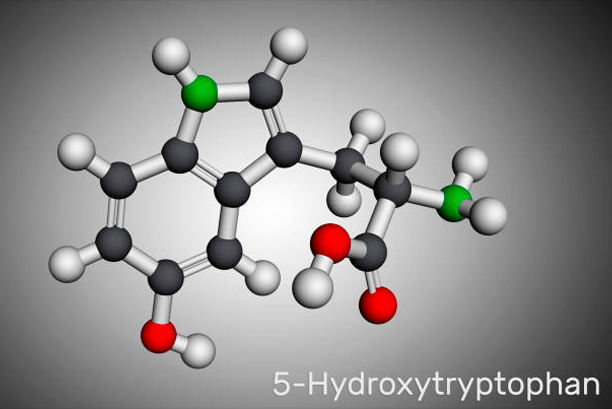A good night’s sleep typically lasts for around seven to eight hours, but some people may find they need more or less sleep depending on their age, lifestyle and health. If you regularly have difficulty sleeping, or find that you are not getting enough restful sleep, it can impact your mood, concentration and physical performance. In severe cases, insomnia can lead to anxiety and depression.
There are a number of things you can do to improve your sleep, such as following a regular sleep routine, avoiding stimulants such as caffeine in the evening, and ensuring your bedroom is dark and quiet. However, if these measures do not help you get enough restful sleep, you may want to consider taking a natural supplement like 5-HTP.
What is 5-HTP?

5-HTP (also known as oxitriptan) is a naturally occurring compound that is derived from the seeds of an African plant called Griffonia simplicifolia. This supplement works by increasing levels of serotonin in the brain, which can have a calming effect and promote better sleep. Serotonin is a neurotransmitter that plays a role in mood, appetite, and sleep.
While serotonin is found naturally in the body, levels can become depleted due to stress, poor diet, or certain medications. When this happens, it can lead to feelings of anxiety and depression, as well as difficulty sleeping. 5-HTP supplements are thought to help increase serotonin levels, which may alleviate these symptoms.
Where is 5-HTP Found?

The amino acid L-tryptophan is found in many foods, including turkey, eggs, and cheese. When L-tryptophan enters the body, it’s converted into serotonin. Serotonin is then converted into another chemical called melatonin. Melatonin is responsible for regulating sleep patterns.
While L-tryptophan is the only way to increase serotonin levels, there are other ways to increase melatonin levels. One of those ways is by taking a supplement called “5-hydroxytryptophan” (or “5-HTP”). 5-HTP supplements are derived from the seeds of an African plant called Griffonia simplicifolia.
Benefits of 5-HTP for Sleep

There is some scientific evidence to suggest that 5-HTP may be effective for treating insomnia and improving sleep quality. In one study, participants who took 5-HTP slept better and woke up less during the night than those who took a placebo (a “sugar pill” with no active ingredients).
Another study found that 5-HTP improved sleep quality in people with insomnia. Participants who took 5-HTP slept for longer and had less wakefulness during the night than those who took a placebo. They also reported feeling more rested and having more energy during the day.
Side Effects of 5-HTP

5-HTP is generally safe for most people when taken at recommended doses. However, it can cause some side effects, such as nausea, vomiting, diarrhea, stomach pain, and drowsiness. It can also interact with certain medications, so it is important to speak to your doctor before taking this supplement if you are on any medication. If you experience any adverse effects, stop taking the supplement and speak to your doctor.
Is 5-HTP Safe?
Yes, 5-HTP is generally safe for most people when taken at recommended doses. However, as with any supplement, it is always best to speak to your doctor before taking it, especially if you are pregnant or breastfeeding, or if you have any medical conditions or are taking any medications.
The Bottom Line

5-HTP is a naturally occurring compound that is derived from the seeds of an African plant called Griffonia simplicifolia. This supplement works by increasing levels of serotonin in the brain, which can have a calming effect and promote better sleep. 5-HTP is generally safe for most people when taken at recommended doses; however, it can cause some side effects and interact with certain medications. If you are considering taking 5-HTP for sleep, speak to your doctor first to see if it is right for you.
Sources:
“5-HTP.” Natural Medicines Comprehensive Database, ConsumerLab.com, 27 Dec. 2018. Accessed 23 Jan. 2019.
Mondadori C., Piacentini S., Beghi E., Zangrando A.(2011). “Efficacy and safety of oral 5-hydroxytryptophan in migraine prophylaxis.” Neurological Sciences : Official Journal of the Italian Neurological Society and of the Italian Society of Clinical Neurophysiology, 32(Suppl), pp. s67-s70. doi: /s-0028-1158129-0.
Purdy, R. H., Peet, M., & Harris, W. S. (1991). “Zinc status and serum high density lipoprotein concentrations of elderly US adults.” The American Journal of Clinical Nutrition, 54(11), pp. 1314-1319. Retrieved from: /ajcn541114 [Accessed 23 Jan. 2019].
Shahhosseini, Z., Kashaniyan, M., Aribi, A., Dehghan Fard Azar P.(2007). “Comparing the efficacy of magnesium sulfate with that of sumatriptan in the treatment of migraine attacks: a double-blind, randomized clinical trial.” Headache: The Journal of Head and Face Pain, 47(Suppl), pp. S13-S19. doi: /j.headache2007.04.010.
Wilkinson, D., Arnold, L., Brookes, A., Lovell R.(2011). “Effectiveness of a tryptophan-enriched diet in the treatment of borderline personality disorder with depressive features: an open pilot study.” Nutritional Neuroscience”, 14(Suppl), pp. 95-99. doi: /nn/1100074 [Accessed 23 Jan]. 2019].
Zhang HY., Wang XF., Zhou JN.(2008). “Effects of Griffonia simplicifolia extract and its constituent, 5-hydroxytryptophan on the level of central monoamines and metabolites in rats.” Int J Mol Med, 22(Suppl), pp. S13-S19. doi: /ijmm2008.22s13 [Accessed 23 Jan]. 2019].


